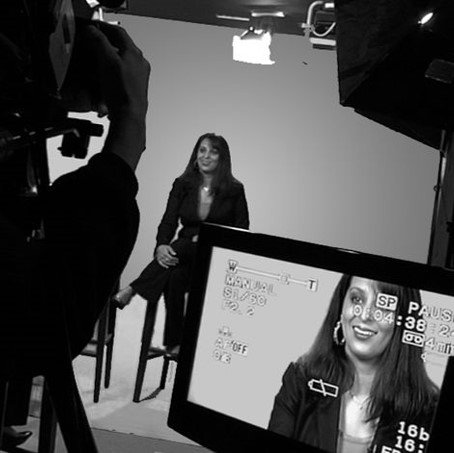As Corporate Recruiting Evolves, Job Seekers Focus on Video Interview Skills

Traditionally, corporations flock to universities several times per year for career fairs, where they collect resumes, hold screening interviews, and set up next steps with interested, qualified candidates. But over the past several years, the number of organizations willing and able to dedicate the time, resources, and personnel to these events has dwindled. Instead, companies like Goldman Sachs are turning to video interview platforms like HireVue and VidCruiter to recruit and screen new candidates. As of 2013, research had found that 63 percent of companies often used video to conduct employment interviews, and that number has only grown.

Source: MariettaVideoProductions.com
What Makes Video Interviews So Appealing in Corporate Recruiting?
Some video interviews are conducted in real time, via Skype or Google Hangouts. But usually, and especially in the screening round, they’re asynchronous, meaning the candidates record one-way video responses to a set of questions the hiring manager has provided.
This saves the recruiting organization time (no more back and forth scheduling individual interviews), money (no more travel to college fairs across the country), and guesswork (they can rewatch videos to catch nuances they might’ve missed in a live interview and compare one directly to another).
And there are some perks for the candidates, as well. They can record and submit their interviews on their own time, and they have the opportunity to plan out their answers and, if necessary, rerecord flubbed first responses.
What Makes Video Interviews Challenging for Candidates?
On the other hand, video interviews are quite different from in-person interviews, and they require a different kind of preparation. It takes work to look natural in front of the camera.
The goal is the same in an asynchronous video interview as it is in a real-time conversation, but the disadvantage of the video setting is that it’s not a true conversation. There’s no live audience to react to and no indicator of whether your response is resonating. And without that other person in the room, it’s easy to fall into a recitative, overly rehearsed tone that eclipses your aptitude and passion for the job.
How Can Candidates Improve their Video Interview Skills?
According to QC’s director of executive communication, Dr. Maegan Stephens, it can pay to sacrifice a little bit of perfection for more authenticity. “While you absolutely want to know your story and have thorough answers prepared, you should avoid memorizing word-for-word responses—and don’t forget to smile.”
Of course, just like with any skill, the best way to improve is through consistent feedback, and university career services and professional development offices are constantly on the lookout for tools they can use to empower their students to land top jobs after graduation. While individual coaching is prohibitively expensive, Quantified Communications’ data-driven approach to communication measurement and improvement offers personalized feedback and improvement plans at scale to help job seekers ensure their video interviews highlight their qualifications and position them as the best candidate for the job.

It’s a new era for corporate recruiters, and the hiring managers’ automated systems require a change in strategy from universities aiming to help students put their best selves in front of recruiters.